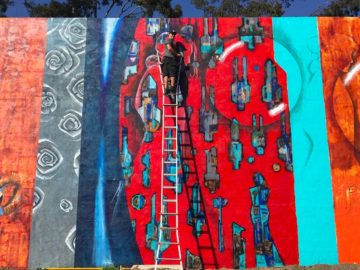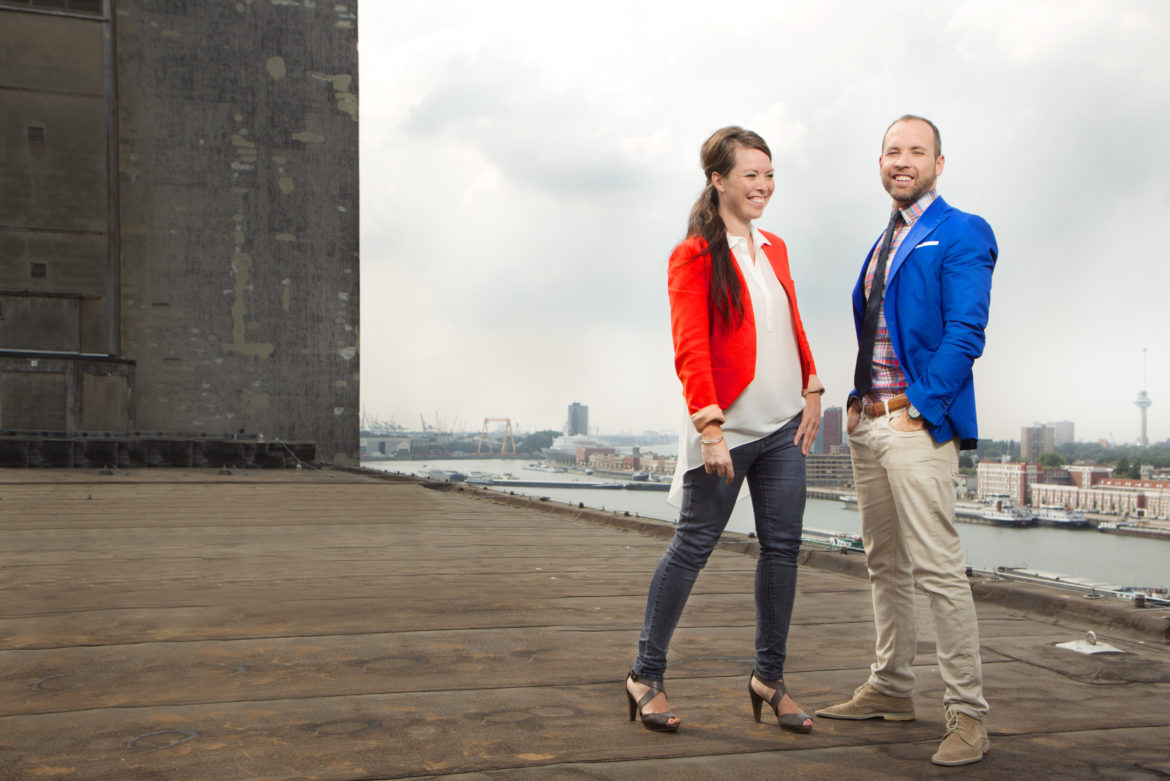
Tchai on Redefining the Family Business
BY PAKSY PLACKIS-CHENG
tchai, a family business, build retail concepts for global brands such as Bugaboo, Rituals and Teva. The third-generation owners, Kim and Edward Tchai, are currently undergoing an extensive process to take their own company beyond today.
The Tchai siblings are offering their employees a platform to realize their passions and potentials as part of their company roles and responsibilities. Shedding job titles and job descriptions, they are figuring out who their colleagues are, their hopes and dreams, and how that translates in their work. Moreover, tchai is inviting other entrepreneurs to join a new way of working.
What are you seeing with all these brands you’re working with and the ever-changing landscape of consumers’ shopping experiences?
Kim Tchai: In the Netherlands, you’ll see a lot of big changes—even chains are going bankrupt. If you don’t change, you’re not going to be here in a few years.
If you are a brand or retailer, you will need to figure out why you’re here, what kind of target group you have, and what the target group, in combination with your brand, want to see. It is very important that you stay within your own roots.
That’s a lot of soul searching.
Kim Tchai: Yes, brands have to look at their core values. We also look at trends, but those aren’t important because trends fade away and your brand stays.
Give me an example of a clients that has yielded a lot of success.
Kim Tchai: In cooperation with a concept agency in London, we did this brand development for Run2Day on the Meent in Rotterdam.
The stores were old-fashioned. We looked to the city and translated the city into the retail environment. What’s the most important thing? Okay, you want to sell good run gear and good run equipment, but the provided information and service are more important than selling Nike or selling Adidas. We created an environment where, if you’re a runner, you can come and get the best advice and products, which is different for every person.
We translated the city into the shop. That is making a connection with the target group who visits the city and runs in the city.
The concept was very successful and now we’re going to make a shop in Amsterdam where you have a different story because Amsterdam is different from Rotterdam.
What would be an element that would be different?
Kim Tchai: In Rotterdam you have rough and raw materials. Concrete, brick…
Edward Tchai: In the store you will find seven different bricks that you can find in Rotterdam. Because the Rotterdam marathon is a big international event, you can find a heritage wall in the store.
Kim Tchai: We also used the shapes of the Rotterdam Central Station in the shop’s furniture. You will not find any of these elements in Amsterdam.
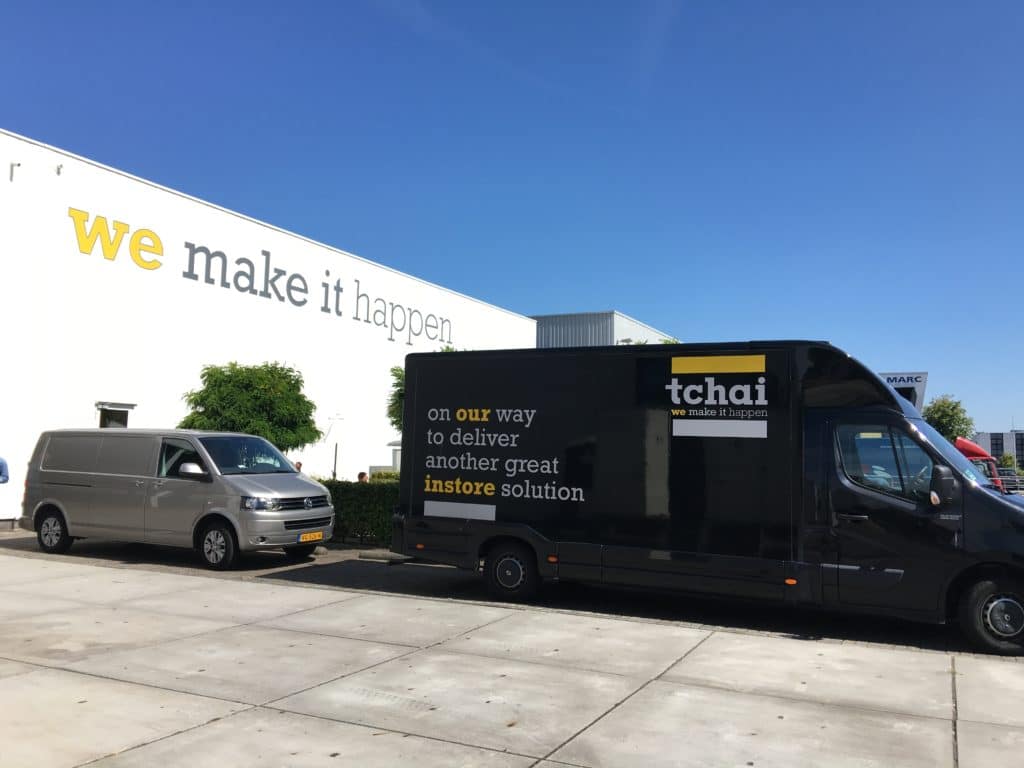
tchai’s office
How has tchai changed as a company?
Edward Tchai: We’ve changed a lot.
Kim Tchai: Yes, and we’re still changing. [Laughs.] When my grandfather started we were very customer-conscious, fast, and flexible. When a company evolves, sometimes you act according to customer’s expectations.
Edward Tchai: When you’re growing you get rules and processes that makes you think you have control, but in the end you’ve moved further from the core.
We are changing that back again. We have just one leading rule: be in agreement with your colleagues, All the processes and all the rules are secondary.
We are trying to look at every situation in a new way. We don’t want to have the pattern of doing things, but we want to start with thinking first. If you see everything as something new then you have to rethink what’s the best way to get to your goal, and because of that, you’re changing continuously. You have that experience you take with you, but not the way you’re working. Every question is something new.
Kim Tchai: In the past, when we received questions from customers, we would say, “Okay this is the account manager,” and then account manager has the briefing document, then you have the project manager, then you have design, and eventually, everything was a process. Because of all of those rules, you’re going to think like a machine.
Now, if you have a question of the customer, you are constantly challenging yourself to give the best answer or the best result. Not because of the process or all the rules, but because that that’s the best way to go.
So how is this new way of thinking working for your employees?
Edward Tchai: We have presented our new vision of the future. We said, “You have all these departments and functions and job descriptions…” When you join a company, you are hired to do a certain job, but ten years further, your interests may be different but you’re still doing the same job.
What we are doing now is that we get rid of all the job descriptions. We are getting rid of all the departments. We want to invest in people, really in the person, working in this company so they can see what they really want, want to become, or what they can do.
They can see the company as a platform where people can make choices in life to become what they want to be.
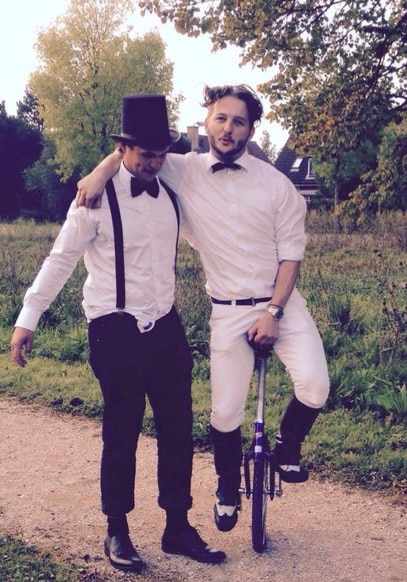
From tchai’s brand book
Some people may not be ready?
Kim Tchai: Yet. Or maybe not ever, but that is also fine. We don’t want to let people go. People need to look into their self. Is this what I want to do? Do I want to work here? Does it suit me?
Where is this coming from?
Edward Tchai: If you see what’s happening in the world, you realize you don’t have any control in it. In my mind, society is conflicting with what it is supposed to be. It should be about helping each other, to grow, and to have a positive way of life.
We have 50 people working in this company that we can change in a positive way, and if you change things in a positive way, it always comes back to you in one way or another.
Kim Tchai: It’s to give people the opportunity to look for themselves. What do I want when I wake up in the morning? Where do I want to go? It’s to have more fun working and doing what you love doing.
I think that’s really important, but it’s very difficult because we’re already trained. I have two kids. When you are parenting, you say, “Okay, now these are the boundaries — you’re not allowed to do this.” They say: “Why not?”
Sometimes it really kills the creativity of kids. That’s how we’re raised. We want to give people the opportunity to look and say, “…what do I want to do?”
Why is this important to you?
Edward Tchai: It is what we could give to the world, so if we can affect 50 people’s lives in a positive way, then they’re also going to impact their family and friends in a positive way.
You can do the right things or you can do the things right. In every situation we ask, “Are you doing the right thing?”
Where is this going?
Kim Tchai: During the kickoff of the new visions for the company, we took our logo and cut it in pieces. We symbolically gave the company away to colleagues because that is what we are doing. We’re inviting our 50 employees to become entrepreneurs.
Together with all the colleagues, we want to know where we are going for the next years. Together we want make beautiful things and having fun doing it.
Give me an example of the impact that you would like them to have — what do you invite them to participate in?
Edward Tchai: I think setting this up, we can go any direction. If you have 50 people that are open, then the possibilities are there. There can only be good things growing out of it. At this moment, we are starting with environmental things. If you have 50 people who you invite to open themselves up about improving their environment, there is a strength of the group.
You are also inviting other entrepreneurs outside your company to participate. How do you envision that?
Edward Tchai: We have a building with too much space — which is unusual for most companies. What can you do with the space that could help others? So we are setting up a creative hub for young companies that can use our facilities. In return, we can use their brains regarding new ideas and technologies.
Kim Tchai: Currently, we are hosting people with engineering and technical backgrounds. We may collaborate with companies on projects too.
Who had an imprint on your professional DNA?
Edward Tchai: When I entered the company, I subconsciously did things. The last five years I became more conscious about why is my brain is working differently than how tchai used to work. From there I went reading and did a bit of soul-searching myself. I came across Ricardo Semler.
I looked at myself, I always have had challenges in life that were presented to me by my parents. But what are you going to do with the challenges?
It’s not always the easy way but you have to do something with it. I thought, “Okay, if that works for me and helped me make better choices in life then I want to gift it to the people in the company in the same way.” Hopefully we can be inspirational — to give people the chance that we had.
A breakthrough came by Fredric Laloux who wrote Reinventing Organization. He is describing how things in companies are changing. In the book were some examples of companies going through the process where we are now.
We started the company with a three-day course with psychologists. What you are and what you do are different things. We first looked at the human element — to let people explore who they are.
A psychologist is here four days in the week. She is helping us implement projects. Normally, it’s always about work, how we do things, but this is about the step before. It’s important to know why we do things that form perspective.
Give me one word that describes your journey so far.
Edward Tchai: I’d like two words: when it goes well, it’s energetic. Sometimes you are stuck in a position and it’s a little bit sour. It depends on the day! [Laughs.]
Kim Tchai: For me it is development. I think that you need to develop yourself constantly. Development can be frustrating, of course, but if you have frustration, then you also grow and develop. That’s the journey we are in.
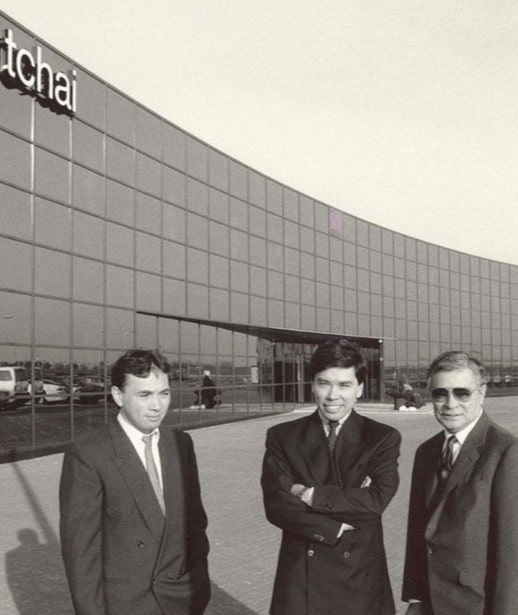
tchai’s founder and father of Kim and Edward
What does your father say about all these developments?
Kim Tchai: Sometimes it’s difficult because he did this job all those years in the way that he knows best. This is a different way of thinking… Edward Tchai: …from full control to letting everything go and trust. Kim Tchai: He gave us his blessing, but sometimes it’s difficult to follow for him.
Edward Tchai: He was a pioneer. We want to be pioneers. What I want to do with the company is to show the world that it is possible to have an honest and open community and to have a positive perspective. Many things are wrong in most of the companies in the world. It’s all about ego, power, and finance — those are things that are not helping anybody.



